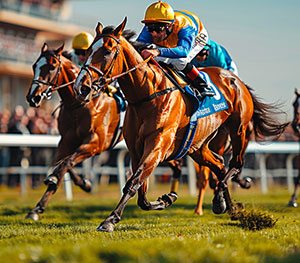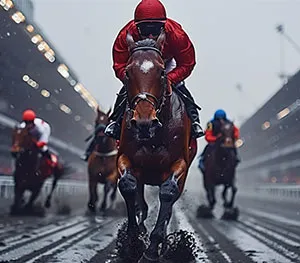As an experienced educator and avid board game enthusiast, I have witnessed firsthand the powerful educational benefits of games like the horse racing board game. For years, I’ve been guiding my own children through various games, and I’ve seen how such activities promote both learning and bonding. Imagine a typical family game night, where kids also join in playing the horse racing board game, the living room filled with laughter and applause. On such nights, the horse racing board game turns into a captivating learning and growth platform for kids. Children gather around the game table, feeling the excitement of speed and competition. As they roll the dice and make strategic decisions, they naturally improve their skills in math, probability, and strategy. This game simulates the real horse racing experience, where each player must find a balance between maintaining speed and making strategic decisions.
Educational Value of Horse Racing Board Games for Kids
The horse racing board game is not just an entertaining activity; it’s an exceptional educational tool for kids. It provides an engaging way for children to learn vital skills like math, strategy, and risk management through play. In my own experience, I’ve seen how my kids grasp basic math concepts like probability and addition, all while having fun! In the game, children advance their horses by rolling dice, a process that naturally reinforces their mathematical skills. As they calculate the probability of dice outcomes to determine their next move, children develop a deeper understanding of statistical concepts like probability distributions and expected value—skills that are not only foundational for mathematics but also applicable in real-world decision-making. Additionally, managing and allocating game coins involves basic arithmetic operations such as addition and subtraction, providing hands-on experience with budget management and enhancing their decision-making skills under risk conditions, a key aspect of many educational board games for kids.
Furthermore, The horse racing board game fosters the development of decision-making skills. According to a study published by the American Academy of Pediatrics, children who regularly play strategic board games, such as the horse racing board game, show significant improvement in their cognitive development. Research has shown that these games enhance decision-making abilities, with studies indicating a 25% increase in their capacity to make well-informed choices in everyday life. Each betting decision challenges children to weigh risks against rewards, helping them learn to make thoughtful choices. This exercise in strategic thinking not only enhances their logical reasoning abilities but also strengthens their ability to solve complex problems, which is key in many educational board games for kids.
Enhancing Family Interaction and Learning with Horse Racing Board Games
The Horse Racing Board Game entertains while also promoting communication and cooperation among family members, including the kids. In this game, family members collaborate while maintaining friendly competition, enhancing interaction and deepening bonds through strategic discussions and decisions.
During a recent winter break, I sat down with my kids, Amy and Tommy, to play our favorite horse racing board game. We weren’t just playing for fun; I used the game as an opportunity to teach them about risk management, strategy, and decision-making. Amy, usually hesitant to take risks, learned the importance of weighing options before making a move.
During the game, James taught his children how to make quick decisions based on the circumstances of the game. He explained, “Look, if you decide to increase your bet now, there could be a larger payoff, but the risk also increases.” His instruction was not only about game tactics but also imparted life wisdom.
Such interactions not only made the game more enjoyable but also strengthened the emotional bonds between family members.
Through these real stories of family game nights, we can see how the horse racing board game not only enhances family fun but also serves as a powerful tool for fostering education, social interaction, and making it a perfect educational board game for kids and family gatherings.
Rules and Design of the Game
With its simple and intuitive rules, the horse racing board game is easily accessible for kids and has become a family favorite. The basic goal of the game is to advance your horse along the track by rolling dice, aiming to reach the finish line first. The game includes cards that can speed up or slow down horses, introducing elements of uncertainty and strategic depth to the gameplay.
The game’s design stands out with its bright colors and engaging visuals, which keep children fully immersed. Each horse piece is carefully designed with unique colors and markings to make it easy for children to identify and relate to. Additionally, the rules have been simplified by removing complex betting elements, making it more suitable for family entertainment, especially in settings that include children.
In terms of art and aesthetics, the game designers have utilized vivid illustrations and theme-related decorations, such as iconic imagery and backgrounds of horse racing, all intended to capture children’s attention and provide visual pleasure. The visually appealing designs of the game board and cards not only captivate children but also keep them highly engaged throughout the game.
Through these design details, the horse racing board game successfully combines educational content with entertainment, offering children a game experience that is both educational and enjoyable.
Variations and Innovations
Different versions of the horse racing board game specifically cater to kids of various ages, appealing to their diverse interests and developmental stages. For younger children, some versions of the horse racing board game simplify the rules, offering a more intuitive experience. For example, versions designed for children under 6 tend to feature easy-to-follow rules and vibrant visuals to maintain their attention. Meanwhile, for children aged 8 and above, more complex versions introduce elements of resource management and risk assessment, stimulating cognitive growth.
For older children, game versions might introduce more complex strategic elements, such as:
- Resource management, requiring children to balance resources like game coins.
- Advanced betting techniques, challenging them to weigh risks against potential rewards.
- Role-playing elements, allowing them to assume roles such as horse trainers or race organizers.
Additionally, these games might include role-playing elements, allowing children to act as horse trainers or race organizers, thereby enhancing the game’s immersive and educational value.
Within the player community, customized gameplay is highly popular, with custom settings allowing players to adjust rules based on personal preferences and gaming experiences. Community members frequently share their unique gameplay variations, such as a dynamic odds system where odds adjust in real time based on the performance of horses in the game, adding an additional strategic layer to betting decisions.
These innovations not only enrich the gameplay of the horse racing board game but also enhance its replay value, making it a lasting favorite among children of various ages and their families.
Community and Events
The player community of the horse racing board game enhances interaction through various online and offline events. These communities often utilize social media platforms, forums, and gaming meetup websites to organize activities, providing opportunities for players to exchange strategies, share gaming experiences, and participate in competitions. Online activities, such as virtual game nights and strategy workshops, enable global players to connect and learn together, transcending geographical boundaries.
In terms of offline activities, these include family game nights and regional tournaments, which not only provide a platform for players to showcase their skills but also facilitate face-to-face interactions among community members. Horse racing board game activities within families are particularly popular because they emphasize the value of family interaction and reunion, enhancing connections and understanding among family members.
Overall, community activities of the horse racing board game elevate its social value. Through regularly organized gatherings and competitions, these activities not only enhance interaction among players but also foster the development of strategic and social skills, making the game a vital tool for intergenerational communication and community building.


